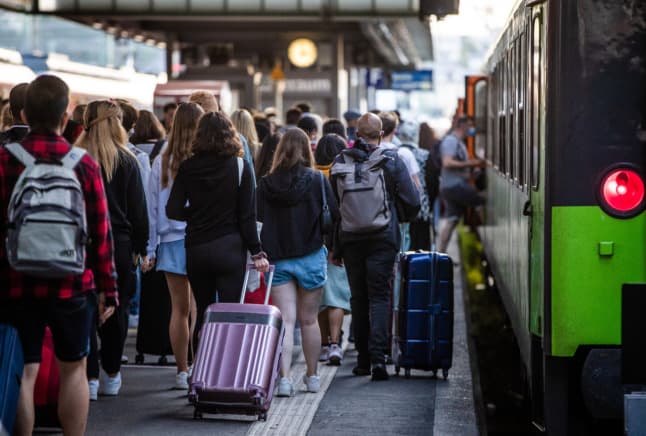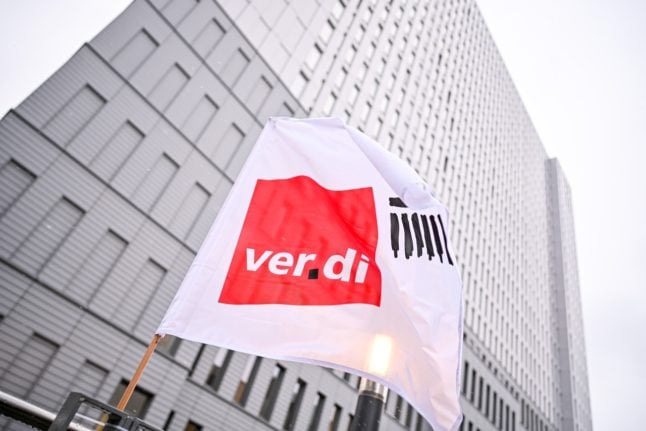Reader question: Will there be more strikes in Germany over Easter?

Public transport across Germany was largely paralysed on Monday as workers around the country went on strike for higher wages. Could we see a similar strike over the busy travel weekend of Easter?
Following Monday’s ‘mega strike’ - an unprecedented nationwide strike which paralysed nearly all local and long-distance public transport in Germany - many are questioning whether the industrial action will extend into the upcoming Easter holidays and beyond.
READ ALSO: Germany hit by major disruption as transport workers stage 'mega strike'
Here’s what we know as of Tuesday.
When are Germany’s Easter holidays?
The official four-day Easter weekend begins on Friday, April 7th, with both Friday and Monday official nationwide public holidays. However, many people already head off for the holidays the day before on Gründonnerstag, which is also when a large number of workplaces give their employees a day off, and Kitas (daycares) and schools shut their doors.
Will there be any strikes over the long weekend?
On Tuesday, the German transport union EVG, who along with Verdi organised Monday’s strike, announced that it would not call for a mass worker walkout over the Easter holidays.
"Since we do not want strike against travellers, but rather employers, we can announce that we will not be negotiating over Easter, and therefore we will not strike," Kristian Loroch, head of EVG’s bargaining said in a statement.
That means that train travel around Germany won’t be impacted, aside from usual packed and delayed trains typical of any busy travel period.
Verdi also announced it would put aside any strike actions over Ostern. "If the [current] negotiations don't work out at all, we can think about it again," said a district spokeswoman in Berlin. "Before Easter, however, a strike is not realistic."
The third, three-day round of negotiations involving Verdi and civil servants association dbb are currently taking place in Potsdam and are set to stretch through Wednesday, March 29th.
Verdi and dbb are calling for an increase in income of 10.5 percent, with a rise of at least €500.

A flag of the Verdi trade union flies during one of their warning strikes in front of the Charite hospital in Berlin-Mitte. Photo: picture alliance/dpa | Fabian Sommer KO
However, this has been repeatedly rejected by municipal employers who have said it is not economically feasible.
Employers have so far offered a gradual five-percent increase over a two-year period, as well as €2,500 in one-off payments, which the unions have rejected as insufficient.
Amid failed bargaining talks over the past few months, Germany has been hit by a series of strikes, paralysing not only public transport, but also major airports and public institutions including Kitas (daycare), rubbish collection, and hospitals.
READ ALSO: EXPLAINED: Why are there so many strikes in Germany right now?
What happens if the unions don’t get what they want?
If the employees don’t reach a collective bargaining breakthrough by Wednesday, unlimited strikes - likely to start after the Easter holiday - are a real possibility.
According to dbb head Ulrich Silberbach: "If the negotiations do not lead to a result, then it will once again be very dark in Germany. Then we will have to enter into a nationwide, indefinite industrial action."
Rather than transport and public institutions around the whole country shutting down all at once, however, this likely means that there would be a continued wave of strikes hitting various states and cities at different times.
Such an action has previously yielded quick results for striking workers. Deutsche Post workers voted in early March to go on an unlimited strike after their pay demands weren’t met.
Just a few days later, however, it reached a wage deal with union Verdi in order to avoid unlimited industrial action.
Deutsche Post workers were then able to receive their desired wage increase of 11.5 percent, with 20 percent offered to the lowest paid workers.
Comments
See Also
Following Monday’s ‘mega strike’ - an unprecedented nationwide strike which paralysed nearly all local and long-distance public transport in Germany - many are questioning whether the industrial action will extend into the upcoming Easter holidays and beyond.
READ ALSO: Germany hit by major disruption as transport workers stage 'mega strike'
Here’s what we know as of Tuesday.
When are Germany’s Easter holidays?
The official four-day Easter weekend begins on Friday, April 7th, with both Friday and Monday official nationwide public holidays. However, many people already head off for the holidays the day before on Gründonnerstag, which is also when a large number of workplaces give their employees a day off, and Kitas (daycares) and schools shut their doors.
Will there be any strikes over the long weekend?
On Tuesday, the German transport union EVG, who along with Verdi organised Monday’s strike, announced that it would not call for a mass worker walkout over the Easter holidays.
"Since we do not want strike against travellers, but rather employers, we can announce that we will not be negotiating over Easter, and therefore we will not strike," Kristian Loroch, head of EVG’s bargaining said in a statement.
That means that train travel around Germany won’t be impacted, aside from usual packed and delayed trains typical of any busy travel period.
Verdi also announced it would put aside any strike actions over Ostern. "If the [current] negotiations don't work out at all, we can think about it again," said a district spokeswoman in Berlin. "Before Easter, however, a strike is not realistic."
The third, three-day round of negotiations involving Verdi and civil servants association dbb are currently taking place in Potsdam and are set to stretch through Wednesday, March 29th.
Verdi and dbb are calling for an increase in income of 10.5 percent, with a rise of at least €500.

However, this has been repeatedly rejected by municipal employers who have said it is not economically feasible.
Employers have so far offered a gradual five-percent increase over a two-year period, as well as €2,500 in one-off payments, which the unions have rejected as insufficient.
Amid failed bargaining talks over the past few months, Germany has been hit by a series of strikes, paralysing not only public transport, but also major airports and public institutions including Kitas (daycare), rubbish collection, and hospitals.
READ ALSO: EXPLAINED: Why are there so many strikes in Germany right now?
What happens if the unions don’t get what they want?
If the employees don’t reach a collective bargaining breakthrough by Wednesday, unlimited strikes - likely to start after the Easter holiday - are a real possibility.
According to dbb head Ulrich Silberbach: "If the negotiations do not lead to a result, then it will once again be very dark in Germany. Then we will have to enter into a nationwide, indefinite industrial action."
Rather than transport and public institutions around the whole country shutting down all at once, however, this likely means that there would be a continued wave of strikes hitting various states and cities at different times.
Such an action has previously yielded quick results for striking workers. Deutsche Post workers voted in early March to go on an unlimited strike after their pay demands weren’t met.
Just a few days later, however, it reached a wage deal with union Verdi in order to avoid unlimited industrial action.
Deutsche Post workers were then able to receive their desired wage increase of 11.5 percent, with 20 percent offered to the lowest paid workers.
Join the conversation in our comments section below. Share your own views and experience and if you have a question or suggestion for our journalists then email us at [email protected].
Please keep comments civil, constructive and on topic – and make sure to read our terms of use before getting involved.
Please log in here to leave a comment.